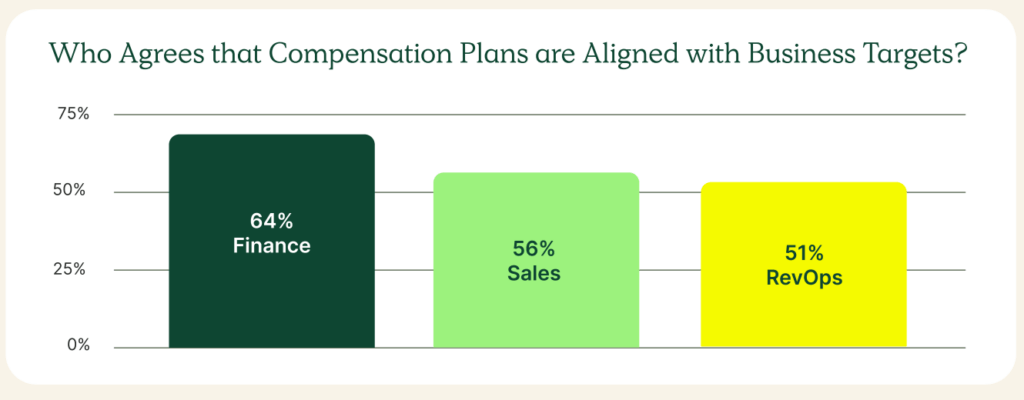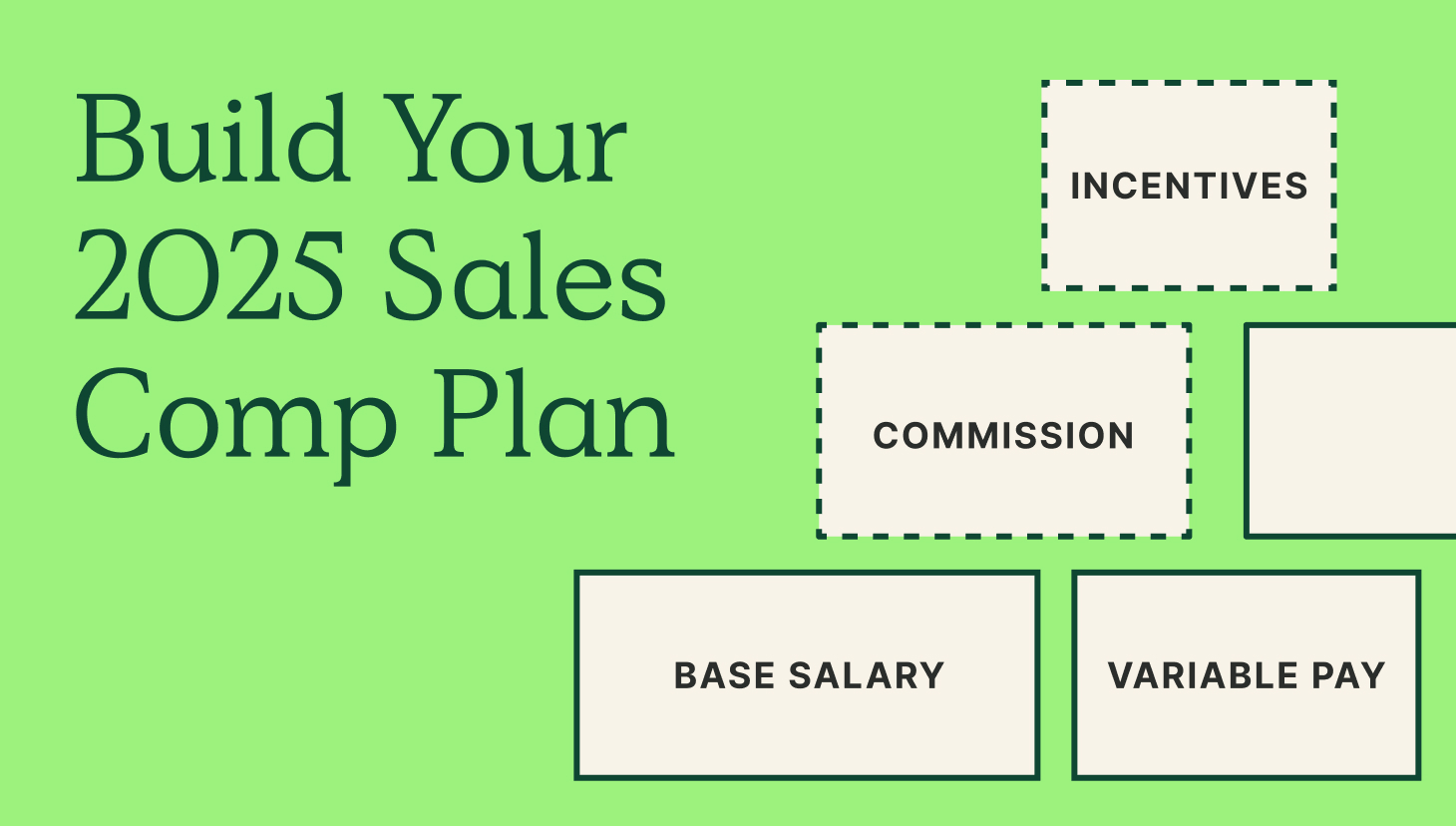Sales teams are navigating a culture of overwork, with burnout rates near 67% and turnover reaching over 40% within a year.
But what if a more thoughtful approach to compensation and coaching could make the difference?
In a recent webinar hosted by QuotaPath and Ambition, industry leaders tackled this pressing issue, sharing actionable strategies to boost sales performance without exhausting teams.
Mark McWatters (VP of Sales, Ambition), Ryan Milligan (VP of RevOps and Sales, QuotaPath), and Christina Brady (Co-Founder and CEO, Luster) brought expert insights on how well-designed comp plans and targeted coaching can drive motivation, align teams, and ultimately create healthier revenue growth.
Interview: Inside the Psychology of Sales
Mental health struggles among salespeople are on the rise. The State of Mental Health in Sales reports revealed that 43% of sellers struggled in 2019, 58% in 2021, and 70% of sellers suffered from mental health issues in 2023.
Take Me to BlogThe Psychology of Sales Motivation
To create a sales culture that supports lasting motivation and well-being, it’s essential to understand the types of motivation driving performance—amotivation, intrinsic, and extrinsic.
Mark emphasized that the most effective motivation strategies blend recognition, rewards, and performance coaching. This allows organizations to tap into intrinsic drivers like professional growth alongside extrinsic rewards.
| Type of Motivation | Definition | Key Characteristics |
| Amotivation | A lack of motivation or intent to act. Individuals feel detached from the value or purpose of a task and may struggle to find any compelling reason to engage. | Low energy, disinterest, minimal to no effort toward goals. Often occurs when individuals don’t see how their actions connect to meaningful outcomes. |
| Intrinsic Motivation | Motivation driven by internal rewards, such as personal growth, satisfaction, or enjoyment. Individuals are motivated by the inherent pleasure or challenge of the activity itself. | High engagement, self-driven behavior, lasting motivation. Often linked to tasks that align with personal values or interests. |
| Extrinsic Motivation | Motivation driven by external rewards, such as compensation, recognition, or avoiding negative consequences. Individuals act to achieve a desired external outcome rather than personal satisfaction. | Action-focused, goal-oriented, driven by rewards or incentives. Often effective in achieving specific, short-term goals but may require ongoing reinforcement. |
Mark noted that focusing solely on extrinsic incentives like pay can fall short if not balanced with intrinsic rewards. Recognizing the importance of employee satisfaction and personal growth can drive sustained engagement, helping to counteract the high burnout rates in sales roles.
Designing Effective Compensation Plans
Tackling the Complexity of Comp Plans
Understanding the nuances of motivation helps lay the groundwork, but effective compensation plans are the next critical step in transforming motivation into measurable performance.
Compensation planning can be complex and emotionally charged.
Both Mark and Ryan noted that reps often dread comp plan rollouts.
Ryan explained, “Your comp plan is one of your best tools when paired with training, coaching, and enablement. It should be motivating and crystal clear, letting reps see exactly how much they’ll make based on the deals they close.”
For example, if reps know they’ll earn more for a multi-year contract with an Ideal Customer Profile (ICP) client, they’re more likely to prioritize high-quality deals aligned with business goals.
Additionally, both leaders emphasized simplicity in comp plans, advocating for plans with only two or three key “bonus” or “acceleration” points.
Ryan illustrated this with a hypothetical scenario: when it’s late on a Friday and a rep has multiple deals in the pipeline, a well-structured comp plan would clearly guide them toward deals with higher commission potential, such as those with multi-year terms or ICP clients. This clarity in earnings can significantly impact rep motivation.
Create Compensation Plans with confidence
RevOps, sales leaders, and finance teams use our free tool to ensure reps’ on-target earnings and quotas line up with industry standards. Customize plans with accelerators, bonuses, and more, by adjusting 9 variables.
Build a Comp PlanKey Metrics and Targets in Comp Plans
One of Ryan’s standout pieces of advice was to tailor comp plans to target top revenue-driving metrics, such as Average Selling Price (ASP) or Gross Revenue Retention (GRR).
For instance, he recommended accelerating commission rates for account managers who secure early renewals or longer-term contracts, thus directly aligning compensation with revenue retention goals.
This targeted approach ensures reps are incentivized to pursue deals supporting sustainable business growth.
Christina echoed this, stressing that misaligned comp plans can inadvertently create misaligned behaviors.
She shared her experience in insurance, where incentives sometimes pressured sales reps to prioritize immediate revenue over customer needs, ultimately harming retention.
She argued that a well-designed comp plan aligns rep motivation with the customer’s timeline, enhancing customer satisfaction and long-term revenue.

Coaching Strategies that Support Compensation Plans
Creating a Coaching Structure
A well-designed compensation plan can align goals and drive performance.
However, consistent coaching is essential to helping sales reps develop the skills and confidence needed to reach their goals.
Mark stressed the importance of structured coaching sessions beyond pipeline reviews.
Regular one-on-one meetings give managers time to focus on skill development and goal alignment, helping reps identify gaps and work toward concrete improvements.
In fact, a proactive “coaching operating rhythm” can establish consistent feedback and accountability across the team, ensuring that comp plans remain aligned with everyday sales activities.
Just-in-Time Learning: Christina also discussed the importance of “just-in-time” learning, a practice in which managers coach reps on immediate skill gaps.
She explained that this approach boosts the retention of new knowledge by encouraging reps to apply skills in real-time scenarios.
Ryan, too, shared an example of this in action.
He worked with a rep struggling to set next steps after demos. Setting a target for the rep to secure follow-ups in three out of four upcoming demos provided a concrete, measurable goal that allowed for real-time performance tracking and improvement.
Streamline commissions for your RevOps, Finance, and Sales teams
Design, track, and manage variable incentives with QuotaPath. Give your RevOps, finance, and sales teams transparency into sales compensation.
Talk to SalesAligning Compensation and Coaching with Business Goals
Now, combine the two.
When compensation and coaching work harmoniously, they create a powerful framework that motivates sales reps and equips them to succeed.
Using Comp Plans to Bridge Departmental Silos
A standout theme from the webinar was the potential for compensation plans to break down silos between sales, marketing, and customer success.
Christina recommended using shared incentives, such as multi-touch attribution. This ensures that everyone involved in the lead journey shares in the revenue success.
As Ryan noted, this cross-functional alignment also helps organizations streamline customer experience by aligning compensation with long-term value.
Case Study: QuotaPath’s Approach to Long-Term Contracts
QuotaPath’s own evolution offers a compelling case for comp plan alignment.
Ryan explained how QuotaPath shifted from monthly to long-term contracts by using accelerated commission rates to incentivize longer commitments.
This strategy helped secure more sustainable revenue streams and encouraged reps to lead with a two-year contract offer as the best practice. By directly embedding this goal into their comp plans, QuotaPath aligned rep motivation with the company’s growth objectives.
Key Takeaways from the Webinar
Empowering Frontline Managers
Mark highlighted the importance of equipping frontline managers with both the time and tools to succeed, cautioning against blaming managers for performance issues without giving them structured processes to follow. He argued that “super-closing” is not a sustainable solution and encouraged companies to establish formal coaching frameworks.
A Unified Approach to Compensation and Coaching
Christina shared that a well-integrated approach to compensation and coaching better serves the customer and provides a seamless experience for sales teams. By ensuring that both plans work toward the same customer-centered outcomes, organizations can create a consistent and productive sales environment.
Motivating for Quality Revenue
Ryan’s final takeaway was that motivating teams to generate high-quality revenue isn’t just about the number. It’s about rewarding reps for deals that align with the company’s long-term goals.
“You know what great revenue looks like for your business,” he reminded attendees, “so make sure that your teams earn the most money for great revenue.”
Closing Thoughts
Bringing together these strategies—thoughtful compensation plans, effective coaching, and aligned goals—creates a sales team that’s motivated and fully equipped to drive meaningful, long-term success.
For more resources on optimizing your compensation strategy, explore QuotaPath’s comprehensive tools and insights or schedule a demo today.
Schedule time with our team here.



